Migrant Women Hired To Make $70 "This Is What A Feminist Looks Like" T-shirts Are Paid $1/hour And Sleep
Migrant women hired to make $70 "This is what a feminist looks like" t-shirts are paid $1/hour and sleep in dormitories with 16 women in a single room.

If it would take a woman worker in the factory two weeks of pay to buy one shirt, what’s feminist about that?
Is it important to know the real story behind our clothes? Read the full story here
More Posts from Dotmpotter and Others
The problem comes from people whose opinions are actually misconceptions. If you think vaccines cause autism you are expressing something factually wrong, not an opinion. The fact that you may still believe that vaccines cause autism does not move your misconception into the realm of valid opinion. Nor does the fact that many other share this opinion give it any more validity… You can be wrong or ignorant. It will happen. Reality does not care about your feelings. Education does not exist to persecute you. The misinformed are not an ethnic minority being oppressed. What’s that? Planned Parenthood is chopping up dead babies and selling them for phat cash? No, that’s not what actually happened. No, it’s not your opinion. You’re just wrong.
Yes, Your Opinion Can Be Wrong | Houston Press
This whole article.
Education does not exist to persecute you.
(via witch-boots)

Fearing the spectacle would be misunderstood, community representatives last week visited the 22 migrants — including 12 children — who have been housed in the Alpine village since the end of October.
They were shown the frightening masks and given insight into the event’s history with the help of an Arabic translator. The verdict? The newcomers had “lots of fun,” according to social worker Nicole Kranebitter.
The migrants “will now know what to expect when St. Nicholas and the Krampus creatures knock on their door,” Kranebitter added.
She said the next event planned for the families who fled war-torn homelands will be traditional cookie baking.
sometimes the world is okay

A Smart Menstrual Cup That Tracks Your Period And Makes Sure You’re Healthy http://ift.tt/1Ltl8JD
Africa, still covered in large swathes of pristine wilderness, is likely to lose much of its biological wealth if dozens of new massive development projects—from highways to railroads to pipelines—get the green light, according to a new study. Most of the projects are designed to increase agricultural production and ease the transport of minerals such as iron and coal. Yet if all are built, they’ll create a spider web of some 53,000 kilometers of corridors through deserts, forests, and savannas—and a host of environmental disasters, scientists say. Even worse, they contend, most won’t help the continent feed its people, even though this is the primary justification behind many of the projects.
“Africa is undergoing the most dramatic era of development it’s ever experienced,” says William Laurance, an ecologist at James Cook University, Cairns, in Australia, and the study’s lead author. “No one disputes its need for food and economic development. But these corridors need to be built without creating environmental crises.”
The scientists’ study is a follow-up to aprevious one they published last year inNature warning about the unprecedented number of road and transportation projects being planned globally.

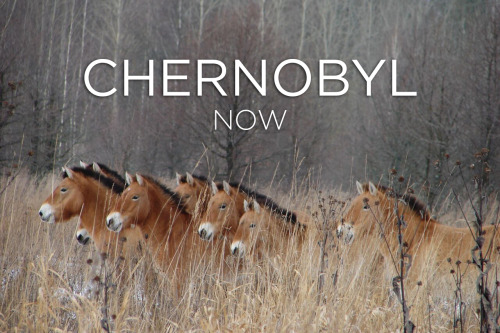
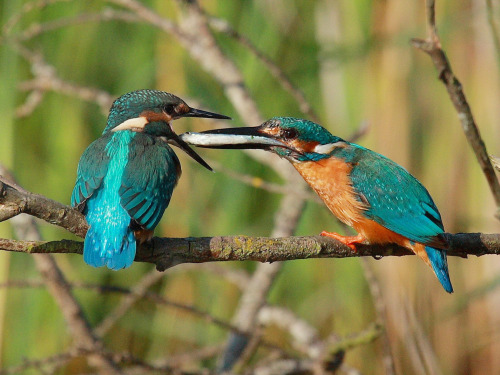
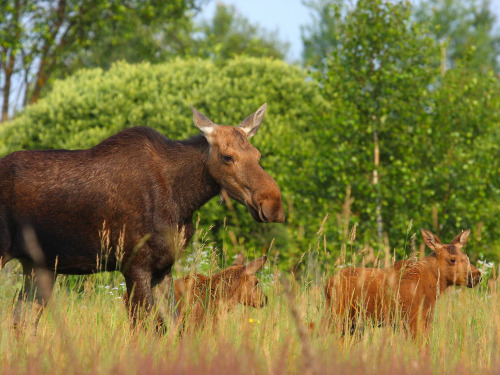
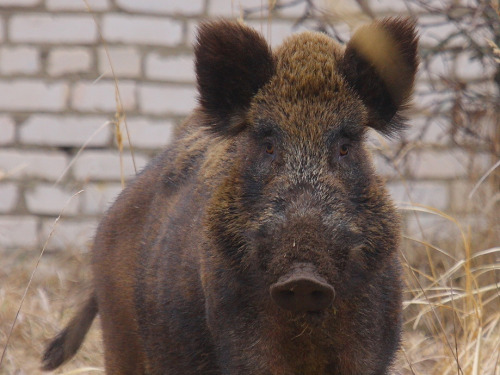
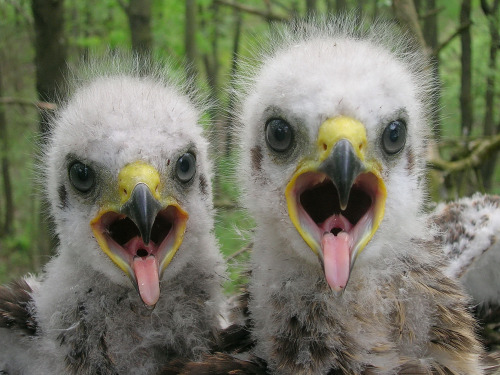
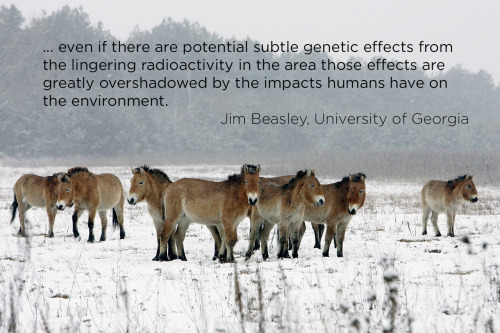
On April 26, 1986, a power surge caused an explosion at the Chernobyl Nuclear Power Plant near Pripyat, Ukraine. A large quantity of radioactive material was released.
On May 2, 1986, the Soviet government established a “Zone of Alienation” or “Exclusion Zone” around Chernobyl – a thousand square miles of “radioactive wasteland.” All humans were evacuated. The town of Pripyat was completely abandoned.
But the animals didn’t leave. And a new study, published this month in Current Biology, suggests they are doing fine. “None of our three hypotheses postulating radiation damage to large mammal populations at Chernobyl were supported by the empirical evidence,” says Jim Beasley, one of the researchers.
In fact, some of the populations have grown. These photos (mostly taken by Valeriy Yurko) come from the Belarusian side of the Exclusion Zone, and area called the Polessye State Radioecological Reserve. Kingfisher, elk, boar, baby spotted eagles, wild ponies, moose, rabbits, and wolves all make their home in the park. In some ways, human presence is worse for wildlife than a nuclear disaster.
Image credits:
1986 Chernobyl - ZUFAROV/AFP/Getty Images
Wildlife photos - Valeriy Yurko/Polessye State Radioecological Reserve
Ponies in winter - SERGEI SUPINSKY/AFP/Getty Images

Now that is pure adaptation!
As the days get darker and colder in much of the northern hemisphere, it’s easy to indulge in gloom. For the next few months, you’ll be shivering. You’ll be battling foul weather. Thanks to daylight saving time there will be no chance to see the sun after work.
The gloom leads to a common question: What can I do to cope with the dark and cold?
If you truly want to be happy during winter, though, this is the wrong approach to the season. Changing your mindset can do more than distracting yourself from the weather.
At first, she was asking “Why aren’t people here more depressed?” and if there were lessons that could be taken elsewhere. But once she was there, “I sort of realized that that was the wrong question to be asking,” she says. When she asked people “Why don’t you have seasonal depression?” the answer was “Why would we?”
It turns out that in northern Norway, “people view winter as something to be enjoyed, not something to be endured,” says Leibowitz, and that makes all the difference.
Lessons From The Far North
To be sure, there are some aspects of the near-polar culture that might be hard to emulate elsewhere. Small Norwegian communities are tightly knit, and strong social ties increase well-being everywhere. That said, there are lessons that can help anyone think differently about cold weather.
Best known as the digital ledger at the core of bitcoin, blockchain is “a great way for making and preserving truths.” Just as blockchain tracks the movement of bitcoins, it could be used as an open way to follow any other good or product, bringing “concrete trustable facts to the retail environment”, she said. For example, Provenance is working on a blockchain project to track fish, noting when and where and how the animal is caught, checking its status with certifiers (such as whether it qualifies as organic) and tracking it as it changes hands, so that data can be shown to the final buyer. That could help brands prove to their customers that products are as promised, helping build trust.
WIRED Retail 2015: Blockchain could track your fish supper from boat to plate (Wired UK)
Setting up any business is a challenge but in Ethiopia those range from daily operating headaches such as on-off internet to even more fundamental business challenges
“The internet goes out a couple of times a week — when that happens, there is not much we can do but rely on phone lines to take orders,” said Feleg Tsegaye, manager of Deliver Addis.
But he also believes the Horn of Africa nation — the second most populous on the continent — offers enormous opportunities.
Tsegaye was born and brought up in the US but moved to Ethiopia, the homeland of his parents, hoping to tap into a still largely untapped but swiftly growing market he believes is one of the most promising on the continent.
“The IT sector is still in its infancy — typically in these markets there is a way to transfer money very quickly and very easily, but here that doesn’t exist quite yet,” he added.
“Once you have a way for entrepreneurs to make money through technology, I think you are going to see that change very quickly.”
With a growth rate of nearly 10 per cent a year over the past decade, according to the World Bank, Ethiopia has attracted entrepreneurs eager to take their cut of a market with over 94 million potential consumers.
The Ethiopian capital Addis Ababa now has three “start-up incubators”, some supported by foreign investors, to help Ethiopian entrepreneurs launch their own business.

Three quarters of Britain’s juniper is found in Scotland, where it’s important not only to local gin production but also to wildlife, such as the juniper shield bug. Plantlife Scotland has published a free guide to help both professional and amateur botanists and horticulturalists identify, survey and protect the plants. Anyone can participate in the group’s survey and guardianship project.
(via Protect British juniper or risk losing gin’s distinctive flavour (Wired UK))
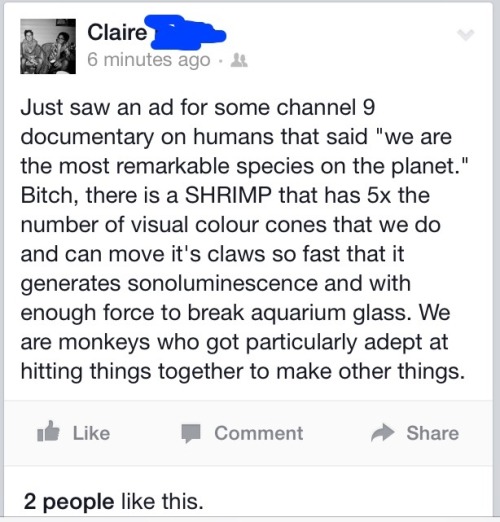
I am not here for the idea that humans > everything else.
-
 sealescali-blog liked this · 8 years ago
sealescali-blog liked this · 8 years ago -
 meowhayley-blog liked this · 8 years ago
meowhayley-blog liked this · 8 years ago -
 ecokayla-blog reblogged this · 8 years ago
ecokayla-blog reblogged this · 8 years ago -
 ecokayla-blog liked this · 8 years ago
ecokayla-blog liked this · 8 years ago -
 lillyinlovewiththeworld liked this · 8 years ago
lillyinlovewiththeworld liked this · 8 years ago -
 frheklin reblogged this · 8 years ago
frheklin reblogged this · 8 years ago -
 frheklin liked this · 8 years ago
frheklin liked this · 8 years ago -
 local-motives-blog reblogged this · 9 years ago
local-motives-blog reblogged this · 9 years ago -
 blawnchair-blog reblogged this · 9 years ago
blawnchair-blog reblogged this · 9 years ago -
 gluten-freemium liked this · 9 years ago
gluten-freemium liked this · 9 years ago -
 aoiferose-blog1 liked this · 9 years ago
aoiferose-blog1 liked this · 9 years ago -
 merbabeemz reblogged this · 9 years ago
merbabeemz reblogged this · 9 years ago -
 merbabeemz liked this · 9 years ago
merbabeemz liked this · 9 years ago -
 thegoldiemedia liked this · 9 years ago
thegoldiemedia liked this · 9 years ago -
 sweetvlly liked this · 9 years ago
sweetvlly liked this · 9 years ago -
 candyyparadise-blog reblogged this · 9 years ago
candyyparadise-blog reblogged this · 9 years ago -
 regg4e liked this · 9 years ago
regg4e liked this · 9 years ago -
 soupersoup-blog liked this · 9 years ago
soupersoup-blog liked this · 9 years ago -
 impactthroughinnovation reblogged this · 9 years ago
impactthroughinnovation reblogged this · 9 years ago -
 vampyr-akademia liked this · 9 years ago
vampyr-akademia liked this · 9 years ago -
 ohsoethical reblogged this · 9 years ago
ohsoethical reblogged this · 9 years ago -
 overcomingravity liked this · 9 years ago
overcomingravity liked this · 9 years ago -
 americaswife liked this · 9 years ago
americaswife liked this · 9 years ago -
 healingfemme liked this · 9 years ago
healingfemme liked this · 9 years ago -
 so-tired-unhappy reblogged this · 9 years ago
so-tired-unhappy reblogged this · 9 years ago -
 xicanaorgullosa reblogged this · 9 years ago
xicanaorgullosa reblogged this · 9 years ago -
 xicanaorgullosa liked this · 9 years ago
xicanaorgullosa liked this · 9 years ago -
 eeelysianfields liked this · 9 years ago
eeelysianfields liked this · 9 years ago -
 amethyst-andemerald reblogged this · 9 years ago
amethyst-andemerald reblogged this · 9 years ago -
 dotmpotter reblogged this · 9 years ago
dotmpotter reblogged this · 9 years ago -
 cosmicladybugs reblogged this · 9 years ago
cosmicladybugs reblogged this · 9 years ago -
 i-fry-water liked this · 9 years ago
i-fry-water liked this · 9 years ago -
 vega--lou reblogged this · 9 years ago
vega--lou reblogged this · 9 years ago -
 yesomgtacos reblogged this · 9 years ago
yesomgtacos reblogged this · 9 years ago -
 yesomgtacos liked this · 9 years ago
yesomgtacos liked this · 9 years ago -
 soup0ftheseus liked this · 9 years ago
soup0ftheseus liked this · 9 years ago -
 soup0ftheseus reblogged this · 9 years ago
soup0ftheseus reblogged this · 9 years ago